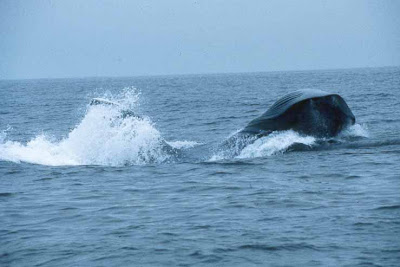 ENVIRONMENT - Climate change will cause a major redistribution of fish and other marine species as they leave their native habitats in search of cooler waters, a new UBC study says.
ENVIRONMENT - Climate change will cause a major redistribution of fish and other marine species as they leave their native habitats in search of cooler waters, a new UBC study says.The migration is expected to see certain cod stocks off the eastern United States cut by 50% over several decades, with most moving north into Canadian waters.
The study paints a distressing picture of oceans that are dramatically reshaped as hundreds of commercially harvested fish species migrate toward the cooler polar regions while others are simply wiped out by invading predators.
 For example exotic species like the Mexican jumbo squid may end up being mainstays in Canadian waters. The giant Mexican squid has already been found off the coast of Oregon and fishermen in the area have reported having to travel farther north to find catches of certain species of cod and stable fish.
For example exotic species like the Mexican jumbo squid may end up being mainstays in Canadian waters. The giant Mexican squid has already been found off the coast of Oregon and fishermen in the area have reported having to travel farther north to find catches of certain species of cod and stable fish.Daniel Pauly, a marine biologist at the University of British Columbia in Canada, co-wrote the study and used computers models to predict the redistribution of over 1,000 different fish stocks and invertebrates as temperatures rise due to climate change.
The researchers used predictions endorsed by the Intergovernmental Panel on Climate Change that are related to temperature increase, water salinity and ocean current patterns to project where fish will be over the next several decades.
Co-author William Cheung said they discovered that on average, fish will likely travel more than 40 kilometres farther north per decade as they seek colder/better habitats.
That means the United States cod population could drop by half by 2050 and the fish will end up clogging Canadian waters. US coasts would see a boost in tropical fish and other species, including alligators, as a variety of species head farther north.
This phenomenon is not limited to water. Land animals have also being heading farther north, with coyotes, wolves and bears leaving the normal habitats and moving farther north.
 The native fish of the northern waters will suffer the most, having more competition and more predators that they are unfamiliar with. Some will lose their habitats entirely.
The native fish of the northern waters will suffer the most, having more competition and more predators that they are unfamiliar with. Some will lose their habitats entirely.For example, krill feeds on algae that grows on ice, but it will see its food source disappear if waters warm to a certain point. Blue whales eat krill almost exclusively and would face extinction if their food source disappears entirely.
Scientists predict the arctic will see staggering amounts of extinctions in the coming decades.



















No comments:
Post a Comment
Comments containing links will be marked as spam and not approved. We moderate every comment. If you want to advertise on this blog it is $30 per link.